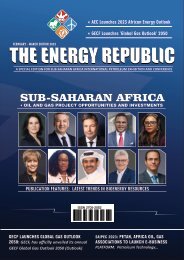OGRepublic August Edition
This edition is focused on Shell Nigeria Exploration and Production Company 'Digital Twin' for its Bonga FPSO.
This edition is focused on Shell Nigeria Exploration and Production Company 'Digital Twin' for its Bonga FPSO.
You also want an ePaper? Increase the reach of your titles
YUMPU automatically turns print PDFs into web optimized ePapers that Google loves.
LOCAL CONTENT
students as well as infrastructure development
support to some schools.
Taking Nigerian Content to the rest of Africa
through Intra-African Trade
There are 18 oil-producing countries in Africa.
The African continent is also home to five of the
top 30 oil-producing countries in the world.
The combined daily oil production of Africa was
more than 7.9 million barrels per day in 2019,
which is about 9.6% of world output.
However, the coronavirus pandemic and
recent OPEC production cuts have dramatically
reduced daily outcome from the Continent.
There is no debating the fact that oil-rich
African countries have not benefited
satisfactorily from the exploitation of their
hydrocarbons.
Though they receive significant fiscal benefits
from the export of oil and gas, the
development linkages to other economic
sectors remain marginal in terms of domestic
value added and job creation. This is why there
is a renewed zeal among these countries to try
and extract as much value as they can from the
Oil and Gas Industry. This is also why many of
these oil-producing African nations have
adopted local content policies as a
development strategy aimed at increasing the
benefits from the Industry.
In most cases, the objective of local content
policy or regulation, as the case may be, is to
transform the short-term benefits of oil
production into long-term local economic
development outcomes through capacity
strengthening, institutional building and
strategic policy tools that promote domestic
economic linkages, job creation and the
participation of indigenous companies in the
sector’s value chain through the supply of
goods and services.
Governments of these oil-producing African
countries often require foreign investors to
develop ‘local content’ by creating jobs,
opening equity to local partners and investing
in local supply chains with the objective of
transferring knowledge and value to the local
economy.
All of Africa’s 18 oil-producing countries have
enacted one form of local content regulatory
framework or the other. Even in the mining
sector, we have seen an enthusiasm for
developing legal frameworks to ensure greater
local participation across the continent.
Therefore, in most of the continent, local
content regulations and institutional controls
are now entrenched.
But what has been the impact on the various
economies of the countries where these
frameworks exist? Are we seeing any significant
change in the economic fortunes of these
countries beyond the collection of royalties and
fees? Are we seeing increased capacity in the
key technical areas?
In the last decade, for instance, Ghana has
joined the league of oil and gas producers. With
its Tilenga Project, Uganda will soon become
another oil producer.
For its FPSO needs, Ghana had to turn to the
Malaysia-based Yinson Holdings. And the
experience appears set to repeat itself in the
case of Uganda’s Tilenga. More than 65 years
after the discovery of petroleum in Africa, the
Continent has yet to develop local technical
capacity to meet some of the Industry’s basic
needs.
However, if the example from Nigeria is a good
indicator of the state of affairs on the continent,
then we can say, we are not yet there, but we
are well on our way.
For it was after the passage of the NOGICD Act
that Nigeria built Africa’s first FPSO integration
quay as well as built and installed six entire
FPSO topside modules on Egina. What African
countries need to do, as a matter of urgency, is
to open the continent to freer exchange of
capacity and trade among one another.
The Opportunities
There will be a great opportunity for intracontinental
collaboration when the Nigerian
Content and Development Monitoring Board
(NCDMB) collaborates with sister local content
authorities in the continent to share ideas,
capacities, and competencies. Nigeria has a lot
to export to other African countries in the area
of local content.
It will be recalled that in March 2018, the 55-
member nations of the Africa Union (AU) signed
the African Continental Free Trade Area
(AfCFTA) to create the largest free trade area in
the world – measured by the number of
participating countries.
The AfCFTA was intended to connect 1.3 billion
people across 55 countries with a combined
gross domestic product (GDP) valued at US$3.4
trillion. The agreement was also intended to
promote the movement of capital and natural
persons.
The World Economic Forum (WEF) describes
AfCFTA as a “global game changer” for the
following reasons:
Poverty reduction: The World Bank estimates
that AfCFTA will boost regional income by 7% or
$450 billion, speed up wage growth for women,
and lift 30 million people out of extreme
poverty by 2035.
Many and varied economic outcomes: It is
estimated that the AfCFTA will increase Africa’s
ex p o r t s by $ 5 6 0 b i l l i o n , m o st l y i n
manufacturing. Intra-continental exports
would also increase by 81%, while the increase
to non-African countries would be 19%.
3Promote trade integrity: an opportunity to
promote good governance both globally and
across Africa, through the concept of “Trade
Integrity” to ensure the legitimacy of the global
trading system.
Expected Economic Boost and Trade Diversity.
The United Nations Economic Commission for
Africa (UNECA) estimates that AfCFTA will boost
intra-African trade by 52.3% once import duties
and non-tariff barriers are eliminated.
It will diversify intra-African trade as it would
encourage more industrial goods as opposed to
extractive goods and natural resources.
Historically, more than 75% of African exports
outside of the continent consisted of extractive
commodities whereas only 40% of intra-African
trade were extractive.
Growing Small and Medium-Sized Businesses:
The elimination of import duties will open up
trading activities to small businesses in the
regional markets.
3Encouraging Industrialization: The AfCFTA is
expected to foster competitive manufacturing,
which means Africa’s manufacturing sector will
have the potential to double in size from $500
billion in 2015 to $1 trillion in 2025, creating 14
million stable jobs.
Babasola opined that the oil industry should
take advantage of AfCFTA to foster intra-African
trade and expand the frontiers of Nigerian
content. Operators need to explore the
possibilities through collaboration with
relevant government agencies of which the
NCDMB has a critical role.
The TotalEnergies Executive General Manager
pointed out clearly that the company remains
proudly committed to Nigeria and Nigerian
content and will continue to act in ways that
promote these ideals.
“But it is now time to venture beyond Nigeria
and foster intra-Africa business relations to
consolidate on the gains of Nigerian Content.
Nigeria can earn foreign exchange through the
exportation of local content capacities,
infrastructure and competencies within the
continent of Africa."
37
OIL AND GAS REPUBLIC I SPECIAL EDITION















